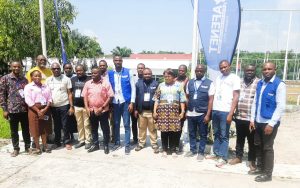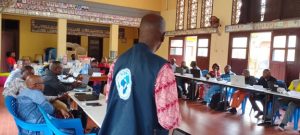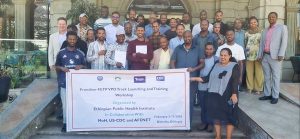TFELTP Activities Conducted in March 2025: Cohort 17 Marburg Virus Disease Outbreak Response – Active Case Search and Mortality Data Review
-
by
AFENET


In response to the Marburg Virus Disease (MVD) outbreak declared on January 20, 2025, in Biharamulo District, Kagera Region, five Cohort 17 residents were deployed to support the outbreak investigation through active case search and mortality data review. In total, 31 TFELTP graduates across all program tiers contributed to the response efforts. From February 6 to March 10, 2025, residents reviewed 4,297 patient records across 13 health facilities and analyzed 244 deaths across four facilities with mortuaries. Their efforts confirmed that no new MVD cases had emerged beyond the initial 10, with the outbreak successfully contained by January 28. The investigation revealed a higher prevalence of VHF-like symptoms among under-five children and males. In addition, 32 healthcare and community health workers were trained on MVD case definitions and alert detection protocols, enhancing local capacity for early detection & response. While 18% of reviewed deaths presented VHF-like symptoms, most were attributed to malaria and pneumonia, and the absence of lab confirmation for some suspected cases underscored critical diagnostic gaps. This deployment demonstrated the vital role of residents in strengthening outbreak response, surveillance, and preparedness in high-risk settings.
National Field Placement
In March, Cohort 17 residents continued their national field placements, a crucial component of the program that allows them to apply classroom knowledge to real-world public health settings. This hands-on experience enables residents to actively contribute to public health decision-making processes. During this period, residents conducted evaluations of various surveillance systems at their respective field sites and presented their findings on the 19th and 20th of March.
A total of 35 residents showcased their evaluations, addressing a wide range of public health priorities relevant to Tanzania and beyond. Several residents focused on components of the Integrated Disease Surveillance and Response (IDSR) system, using case studies on priority diseases such as bacterial meningitis, COVID-19, typhoid, cholera, dengue, measles, influenza, tuberculosis, and HIV. Others evaluated additional programmatic areas, including cervical cancer prevention and control (CECAP), antimicrobial resistance (AMR), pre-exposure prophylaxis (PrEP), and HIV self-testing (HIVST)
Vector-borne and parasitic diseases were well-represented, with evaluations on malaria case notifications, urban malaria surveillance, and surveillance for schistosomiasis, lymphatic filariasis, and trachoma. Additionally, several residents evaluated systems related to vaccine-preventable diseases, including rotavirus and adverse events following immunization (AEFI), as well as maternal and child health programs like antenatal care and insecticide-treated net (ITN) distribution.
Cross-cutting themes included the integration of health information systems, the use of innovative platforms such as Afya Msafiri, and the implementation of digital surveillance solutions in Zanzibar. The breadth and diversity of topics reflect the residents’ deep engagement with pressing public health issues and their commitment to enhancing surveillance system performance at both national and sub-national levels.
Below are photos of residents collecting data during their evaluations.



Other Field Activities Conducted by Cohort 17 residents





Cohort 16
Didactic Sessions
Cohort 16 residents completed didactic sessions for semester 3– Economic Analysis & Evaluation (AE 605) for Epi Track and Laboratory Management, Policy and System Design (LM 602) for Lab track. The two weeks (24th Feb to 10th Mar) trainings were facilitated by senior lecturers from MUHAS and FELTP staff.
In Economic Analysis & Evaluation, the residents covered introduction to prevention effectiveness, burden of disease and health status measurements, decision analysis and different cost analysis methods.
In Laboratory Management, Policy and System Design, the residents covered several topics on management including laboratory documentation and records, organizing, personnel, equipment, purchasing & inventory management. Other topics covered were Lab systems design, legal, ethical issues in the lab & quality monitoring.
Dissertation Data Collection
Cohort 16 residents have traveled to the regions and districts to collect data for their dissertation studies. Fourteen of the fifteen residents have received ethical clearance from the MUHAS IRB. The residents are currently seeking approval/clearance from local authorities or facilities before commencing data collection.
|
NAME |
TRACK |
DISSERTATION STUDY TITLE |
|
Richard Sangu |
Epi |
Malaria Prevalence and Its association with Socio-Demographics, Environmental Factors, and Preventive Measures among Symptomatic Patients in Ngara District, Kagera Region. |
|
John Emanuel |
Epi |
Assessment of the effect of climate variability on malaria incidence in Mbeya Region. |
|
Theresia Rugemalila |
Epi |
Prevalence of medication adherence and associated factors among adult patients with hypertension and diabetes co-morbid in Dar es Salaam |
|
Cephlen Mathayo |
Epi |
The prevalence and factors associated with intimate partner violence among pregnant women in Mara region-Tanzania |
|
Sabina Ipembe |
Epi |
Environmental and socio-cultural factors associated with persistent malaria transmission in Tandahimba DC, Mtwara Region |
|
Jasmine Chilembu |
Epi |
Prevalence, Patterns and Effect of Intimate partner violence on viral suppression among adolescent girls and young women living with HIV in Dodoma |
|
Gwakisa Ngasala |
Epi |
Uptake and associated factors with HIV Viral load testing among children on Antiretroviral Treatment in Ruvuma, Tanzania. |
|
Agnes Tesha |
Epi |
Magnitude and Factors associated With In-Hospital Mortality among adults admitted at Morogoro Regional Referral Hospital from 2022 to 2024. |
|
Nassoro Adam |
Epi |
Incidence, timing, and factors contributing to the transmission of HIV infection among HIV-exposed children during the postnatal period in the Mara region from January 2020 to December 2022 |
|
Moses Ramadhani |
Epi |
Access to HIV Testing and its related factors among Adolescents and Young adults attending Secondary school in Njombe TC |
|
Elizabeth Nchimbi |
Lab |
Molecular characteristics of Escherichia coli and resistance genes causing community-acquired urinary tract infections for outpatients attending primary healthcare in Dar es Salaam and Mwanza from July to November 2021 |
|
Paul Ndiwu |
Lab |
Prevalence and Determinants towards Hepatitis B Virus infections screening uptake among pregnant women attending antenatal care in Ruvuma region. |
|
Reginald Julius |
Lab |
Analysis of genetic make-up of Vibrio Cholera Isolates from the 2024 outbreak in Simiyu Region |
|
Godson Ngowi |
Lab |
prevalence and factors associated with renal and liver function tests uptake among people living with HIV/AIDS on ARV in Njombe region 2024. |
|
Rafael Massawe |
Lab |
Coagulation Profile Among Patients with Type II Diabetes Attending the Diabetes Clinic at Mawenzi Regional Referral Hospital |
Activities Planned for April
1. Dissertation Data Collection Supervision for Cohort 16
2. Field Placement for Cohort 17



